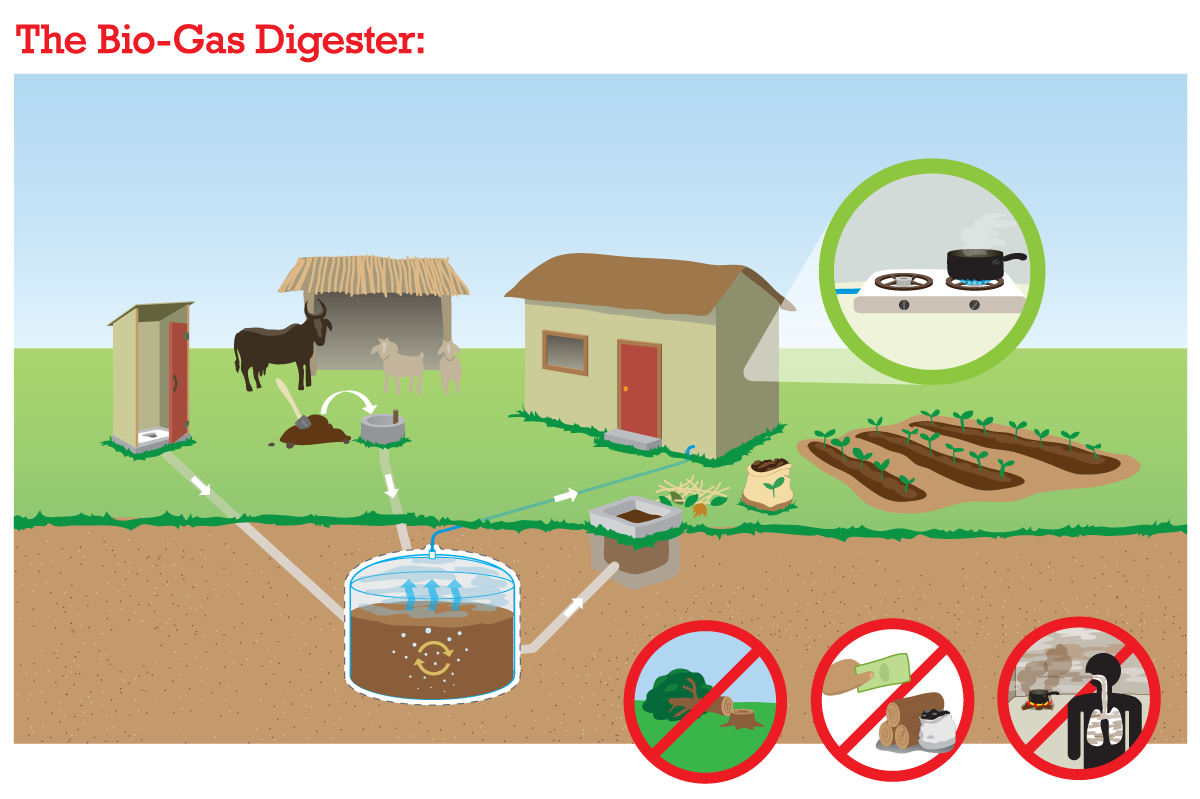What do you know about biogas technology?
If you live in a society where agriculture and livestock keeping is a major component of the local economy, then you need to know about biogas technology. It is a simple technology that recruits the help of anaerobic bacteria, in the absence of oxygen, to break down organic matter and produce a mixture of gases in the process. Biogas plants (or digesters) are fed with organic matter (such as animal manure/excrement, plant waste, food waste) and produce biogas and bio-slurry. The biogas is captured through the digester’s design and can be used for cooking or lightening, or can be pushed further into an electricity generation process.
There are many reasons for biogas technology to be quite intuitive for agricultural communities:
- Economic: production of a highly wanted thing from an unwanted thing, i.e. energy from waste
- Environmental: capturing and using greenhouse gases (such as methane) that are otherwise released into the atmosphere. For some communities access to biogas cooking saves many trees from ending as firewood. It has been estimated that one small biogas plant can save 3 tons of fuel wood per year.
- Agricultural productivity: the bio-slurry, which is the second by-product of the anaerobic digestion process, is quite a good soil nutrient. It can be used in multiple ways to improve the quality and quantity of produce (trust me; I’ve seen it with my own eyes). Thus it also provides an organic substitute to chemical fertilizer.
- Health and hygiene: an efficient way of managing otherwise problematic waste (such as animal excrement) especially in the absence of modern sewage systems. Also using the biogas for cooking is a much better alternative to charcoal and firewood cooking which produces unhealthy smoke. It has also been found that the bio-slurry is quite a good insect repellent (for some reason I don’t know yet).
- Social: the social impact of having access to energy for some off-grid communities in developing societies can be quite magnificent in value for them. Besides the ability of children to study at night, women also are freed from the toils of time and effort spent in collecting firewood for cooking, and can now use that time in various activities that can enhance their livelihoods and more.

source: en.PermaCultureScience.org
Now, to make it even better…
The Tanzania Domestic Biogas Programme (TDBP) is a nationwide initiative with the aim of creating a viable commercial sector for biogas technology in Tanzania. TDBP tries to achieve that by providing training, promotion and temporary subsidies for the construction of biogas plants of different sizes across the country; particularly plants suitable for rural households and small farms. Up to this moment well beyond 10,000 biogas digesters have been constructed in Tanzania under the programme.
For carrying out the construction activities, TDBP provides training and certification for masons who, after training and testing, can become independent contractors who provide the service of constructing certified biogas digesters for any clients. These certified masons are responsible for constructing digesters up to standards and reporting their work in formal ways that guarantee clients good quality digesters and follow-up when needed. The masons are also entitled to some subsidy schemes to support their work and reduce the cost on the clients (thus making more clients interested). Hundreds of certified masons now exist, with many of them currently earning a substantial part of their income from biogas construction (and periodical maintenance).
Masons are also encouraged, through TDBP and implementing partners, to form Biogas Construction Enterprises (BCEs) which can be registered as private independent entities that are in the business of biogas construction. While the ownership (or management membership) of these BCEs is not necessarily restricted to certified masons, it is quite understandable that the majority of them so far are so. Being hands-on implementers, many of these BCEs end up operating technically as cooperatives, with co-owners/masons being both equally the workers and owners of the business. A good number of these BCEs are established and run by young folks with technical certification and training in building and running a viable business.
All in all, it is quite evident that the possibility of creating a viable commercial sector for biogas in Tanzania rests in the success or failure of BCEs. They are the ultimate fruit of TDBP, and it seems that the future of biogas in Tanzania will be as sustainable as BCEs will be.
The small cooperative model of BCEs is quite an interesting social enterprise experiment. Most BCE masons start by building their own biogas digester at their home, and so they are intimately connected to their product. Between the BCEs there is some competition and some collaboration; hopefully striking a balance that allows for some motivation as well as keeping the big picture intact.
It is quite a beautiful thing to observe an environmentally appealing technology being diffused by a socially appealing business model.
———
– for more information, see the TDBP website: http://www.biogas-tanzania.org/

I am interested for this technology. Can please tell me Where is your location at Dar-es-Salaam.
Good morning Expert, l am interested to have your contact address, l am from Cameroon, l have a project to build Biodigester, so l need a supplier of this plant, to produce biogas and manure